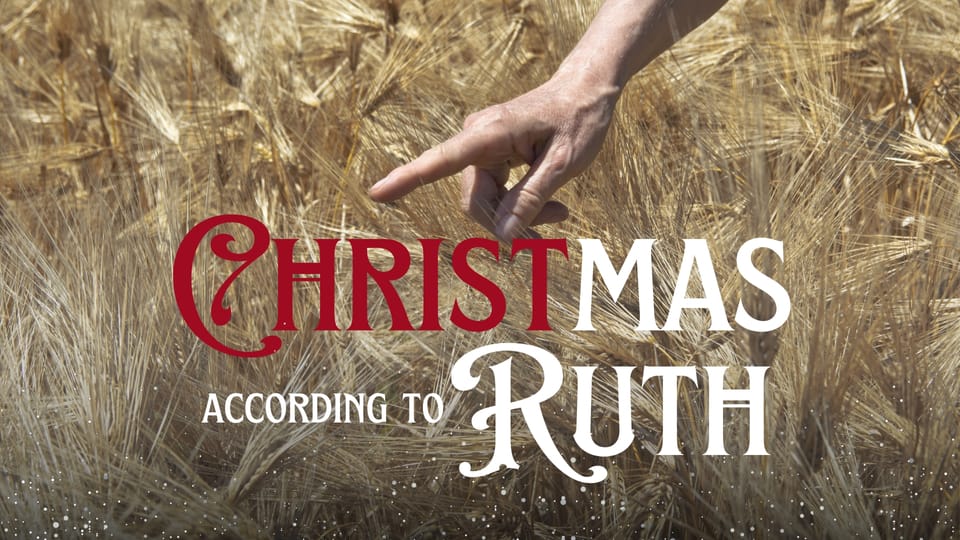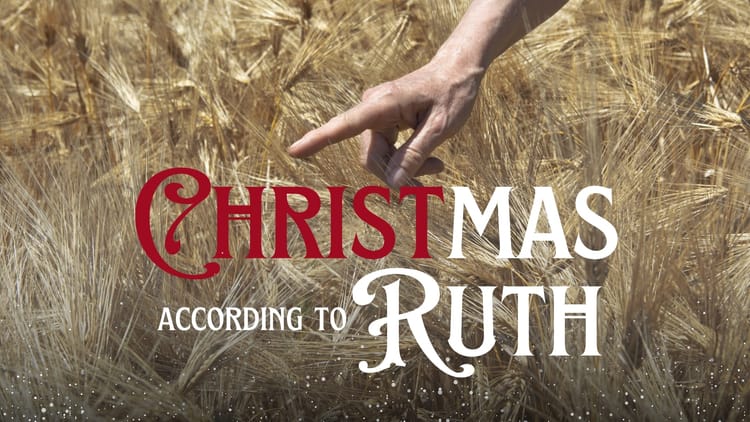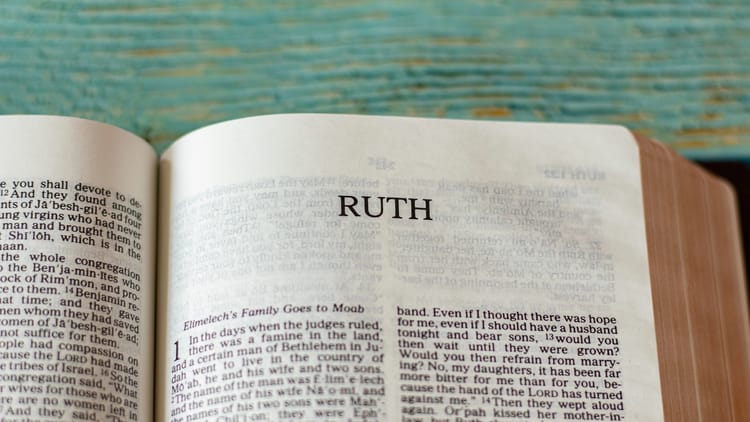When God Seems Hidden (Ruth 1)

Big Idea: God is actively at work in the darkest times and among the most hopeless people, even when it's not obvious to us.
We’re starting our Christmas series a little early this year because next week we’ll be hearing from Paul McDonald. We’re also walking through an unusual book in the Bible as we head to Christmas. We’re looking at the ancient book of Ruth.
Does it ever seem like God is hidden? We go through times when God is very real to us. There’s an old hymn that says:
Heav’n above is softer blue,
Earth around is sweeter green!
Something lives in every hue
Christless eyes have never seen;
Birds with gladder songs o’erflow,
Flowers with deeper beauties shine,
Since I know, as now I know,
I am His, and He is mine.
That is our experience some of the time. But sometimes it seems that we live in a world God in which God is distant, where there’s one tragedy after another. We often question whether living for God has any real value or if our lives can make a meaningful impact. Sometimes it seems that God has hidden his face and there’s little hope, and there’s nothing we can do about it.
If you know what I’m talking about, the book of Ruth might be for you.
Tragedy (1:1-5)
Let me tell you about Ruth.
Ruth lived in the time of the Judges when there was no king in Israel. If you know about this time, you understand that it was one of the darkest times in Israel’s history. This 400-year period took place after the people had settled in Israel, but before they had a king. They kept falling into a cycle of disobedience to God, oppression by foreign powers, repentance, and deliverance through a judge. It was a time of political instability, tribal rivalries, and conflicts with neighboring nations. Things kept getting worse. Everyone acted as their own king and acted as they pleased. By the end of the book, Israel is no better than the worst of the sinful nations around them. Everything seems hopeless. It seemed that God's plans for his people were failing, that he was absent, and that the situation wouldn’t improve.
The events of the book Ruth took place around this time. Things were bad with Israel, but in Ruth we zoom into not the entire nation but one particular family, and things are bad with them too. Verse 1 tells us there was a famine in the land, likely a sign of God’s displeasure on Israel. Due to the famine, a man and his family left Bethlehem, which means "house of bread," and moved to Moab, a land of foreign gods.
They became refugees. God had told his people to stay distinct from the surrounding nations. It doesn’t seem like a great decision, but maybe they believed they had no choice.
Sure enough, things get worse. Elimelech, the husband, died, leaving behind Naomi and her two daughters. Naomi’s name means pleasant or lovely or delightful, but her life wasn’t any of those things now. Naomi became a widow. She joined one of the most disadvantaged and marginalized groups. She faced poverty, few rights, a low social status, and to top it off, she was in a foreign land. It was a bad time, and Naomi’s personal situation had gone from bad to worse.
But she still had her sons. They married Moabite women, which was contrary to God’s word (Deuteronomy 7:3-4). Moabites were bad news for God’s people back then. They wouldn’t have been allowed in the temple. They had the reputation of leading God’s people astray. Marrying Moabite women was bad news.
Sometime after, in this ten-year period, her sons died too, leaving her not only widowed but childless. As an Israelite widow with no sons, she was vulnerable and unprotected. She lost everything.
Ruth 1 is a downward spiral of tragedy. By the end of chapter 1, it looked like all hope is gone. Ruth faced poverty, hardship, and possibly even slavery. Society had cast her aside, and she belonged to the unwanted class. She wondered what she could do to survive in her difficult situation. And God seemed completely absent.
Naomi served as a microcosm for Israel. Is there any hope? Would the Lord ever redeem someone like her, someone like Israel?
We have no control over the times in which we live. We might be living in dark times and facing a desperate situation. We may feel at times that God has abandoned us. We can influence our situation, but some events are beyond our control.
We, like Naomi, may find ourselves in a position we never hoped to face without any reasonable prospect of hope.
Decision (1:6-18)
So Naomi made a decision. She decided to go back to Israel. “Then she arose with her daughters-in-law to return from the country of Moab, for she had heard in the fields of Moab that the LORD had visited his people and given them food” (1:6).
But first, she tried to convince her daughters-in-law not to follow her. Surprisingly, most of chapter 1 is about Ruth trying to convince her two daughters-in-law to stay while she goes back. There’s nothing random in Scripture, so you have to wonder why the author spends so much time here. She blesses them. She pleads with them. She succeeds in convincing one of them to return. But not Ruth.
Why is this such a focus in the story? I think it’s because of two reasons:
First, it’s to underline Naomi's hopelessness. She’s completely lost hope, and she doesn’t want to drag anyone else down with her.
Turn back, my daughters; why will you go with me? Have I yet sons in my womb that they may become your husbands? Turn back, my daughters; go your way, for I am too old to have a husband. If I should say I have hope, even if I should have a husband this night and should bear sons, would you therefore wait till they were grown? Would you therefore refrain from marrying? No, my daughters, for it is exceedingly bitter to me for your sake that the hand of the LORD has gone out against me. (1:11-13)
Hear the pain. Hear the hopelessness. The writer wants us to see how bad things had become for Naomi.
But there’s another reason why the writer spends so much time on this part of the story: because it gives us the first note of hope. In a hopeless story, we get the first glimmer of hope. Read verses 16 to 18:
But Ruth said, “Do not urge me to leave you or to return from following you. For where you go I will go, and where you lodge I will lodge. Your people shall be my people, and your God my God. Where you die I will die, and there will I be buried. May the LORD do so to me and more also if anything but death parts me from you.” And when Naomi saw that she was determined to go with her, she said no more.
Here we have the first sign that God is at work. Ruth renounces the polytheism of the Moabites and embraces the monotheism of the Hebrews. She invokes the name of Yahweh in verse 17, the covenant name of the God of Israel. Things aren’t as hopeless as Naomi thinks.
Ruth left her own family and land. She made one of the greatest possible commitments you could make in the ancient world. She moved to an unknown people with their own language and customs. She pledged to go and stay even after Naomi dies. Going meant she probably had few prospects, but she went. She took the Lord as her own. What Paul wrote later of the Thessalonians is true of Ruth as well: “you turned to God from idols to serve the living and true God” (1 Thessalonians 1:9). God is at work!
When tragedy strikes, when our life unravels, when God seems hidden, it’s so easy to conclude that things are worse than they really are. When Naomi had completely given up hope, God was still working. In fact, what we’re going to see in this book is that God is always at work, often behind the scenes, and nothing can stop him. We only occasionally get a glimpse of what he’s doing, but God is always at work in the world to accomplish his purposes whether we see it or not, no matter how badly things appear to be going.
Back to Bethlehem (1:19-22)
Verse 19 says, “So the two of them went on until they came to Bethlehem.”
In the darkest of times, when there appeared to be little hope, Naomi and Ruth arrived in Bethlehem. The journey would have been anywhere from 65 to 80 kilometers, mostly uphill. The trip would have taken days. It was a far enough trip to walk, and the cultural distance was even greater.
Look what happens when they arrive.
And when they came to Bethlehem, the whole town was stirred because of them. And the women said, “Is this Naomi?” She said to them, “Do not call me Naomi; call me Mara, for the Almighty has dealt very bitterly with me. I went away full, and the LORD has brought me back empty. Why call me Naomi, when the LORD has testified against me and the Almighty has brought calamity upon me?”
The town buzzed that Naomi is back. The ten years had taken a toll on Naomi, and it was probably clear by how she looked. The townspeople don’t even mention Ruth. It’s like they decide they’re not even going to acknowledge her. Naomi told them to stop calling her by her name, which meant pleasant, and instead to change her name to bitter. Naomi saw nothing good about her situation. She was the very definition of failure.
Naomi doesn’t see the full situation. She hadn’t yet seen that God is at work in everything that’s happened. She’s in for a surprise. In the darkest of times, God was at work in every detail of her life. God may have seemed hidden to Naomi, but it doesn’t mean that he had stopped working. The story is just getting started, but there’s no question that God is at work even though Naomi can’t see it yet.
You may be wondering why we’re preaching through Ruth this Christmas. It’s because sometimes it looks like God is hidden. Sometimes it looks like the days are dark. Sometimes, through a series of choices we made and the things that happen to us, we run out of hope. We look around and can’t see any evidence that God cares for us.
But look carefully, and you may find evidence that God is still at work. He’s still rescuing people from worshipping false gods so they can worship Yahweh himself.
Look even more carefully, and you may discover that God never stopped being faithful to his people even when we can’t see it. God is preparing Naomi and Ruth for a child to be born in Bethlehem, a child who will play a decisive role in the history of the world. They can’t see it yet, because they can only see their part of the story, but God knows what he’s doing. If you’re empty, if you’re bitter, if you’re resourceless, if you’ve lost hope, that’s no impediment to God.
It’s just like God to bring someone who has lost all hope and someone who’s not even one of God’s people to the point of desperation, and bring them to the place where they can see God work out his faithfulness to his people. Naomi and Ruth are about to see that God hasn’t abandoned them after all, because a baby was about to be born in Bethlehem in a very dark time, and this baby, as we’re going to see in coming weeks, was going to change the world.
How like God to do this! Because God is still bringing people who are at the point of desperation, who’ve lost all hope, to a point of desperation where they can realize three things:
- God never stopped working, even when they couldn’t see it.
- He loves to include those who are outsiders and those who have lost all hope.
- One baby born in Bethlehem can change everything. It changed everything for Naomi and Ruth. And it can change everything for us as well.
Next week we begin Advent. Advent is a season of expectancy and longing in a dark world. Will things get better? Is there any hope in a world of darkness and in our lives of hopelessness?
Ruth screams the answer: Yes! The Sovereign God of the universe is at work even in the darkest of times, even when we can’t see it, and even with the most hopeless of people, and he’s working out his grand story through the birth of a baby in Bethlehem.
Father, I want to thank you for your mysterious providence. We don’t understand why God’s people suffer like they do. But we cling to the reality that you are always at work even when we can’t see it.
Thank you that you have a way of working even among those who’ve lost hope, even among those who don’t belong. You include them in your story. You let the empty and the desperate into your grand story, and we are thankful.
Most of all we’re grateful for the story that will unfold in Ruth, a story that will result in the birth of a baby in Bethlehem, which will eventually lead to the birth of a king named David, which will eventually lead to the birth of Jesus. Thank you that Ruth’s story is our story. Thank you for Jesus, who did everything to give the empty and desperate hope and life and salvation.
So Lord, help us to see that you’re always at work, even in the darkest of times, even when we’ve lost hope, because a baby has been born in Bethlehem who changes everything. In Jesus’ name we pray. Amen.





